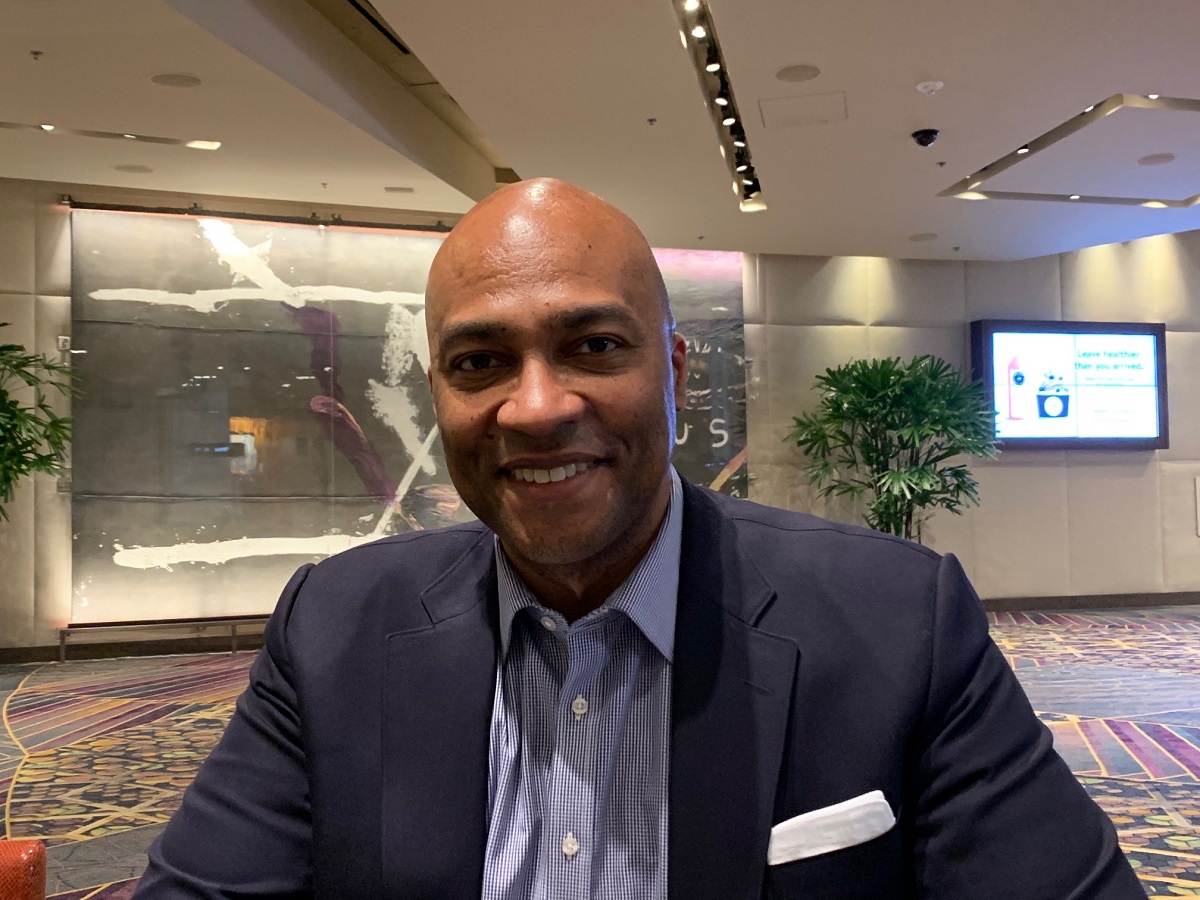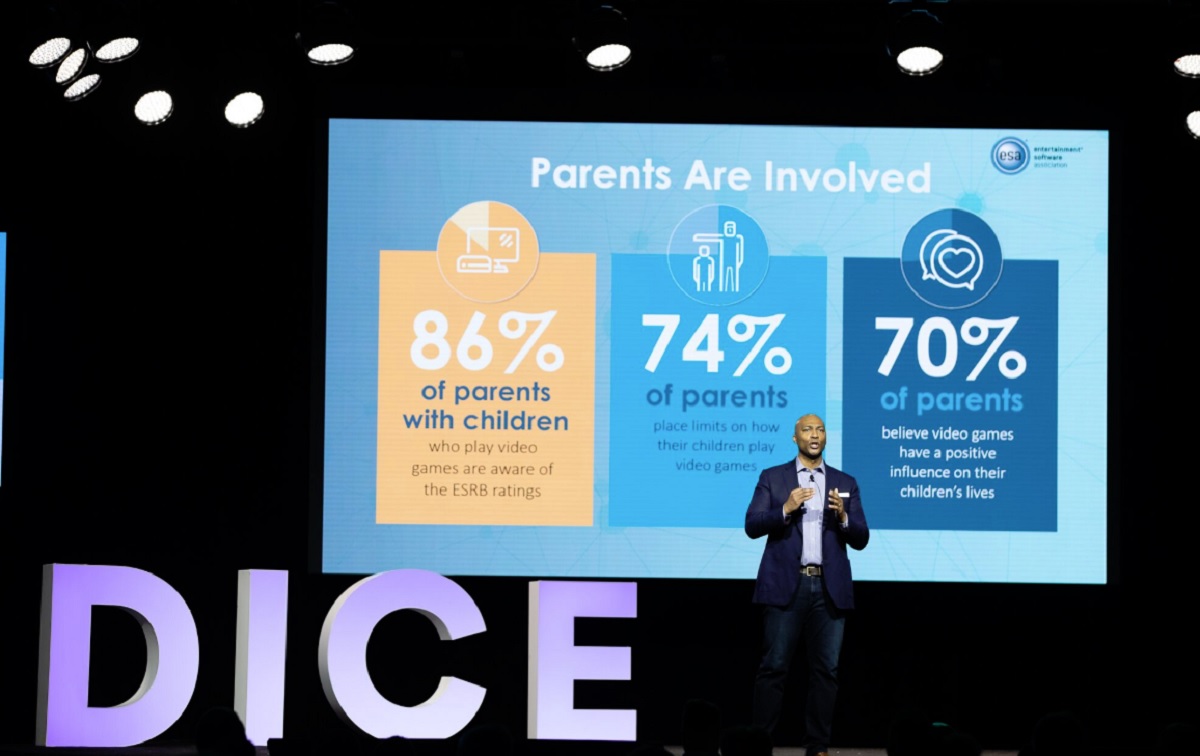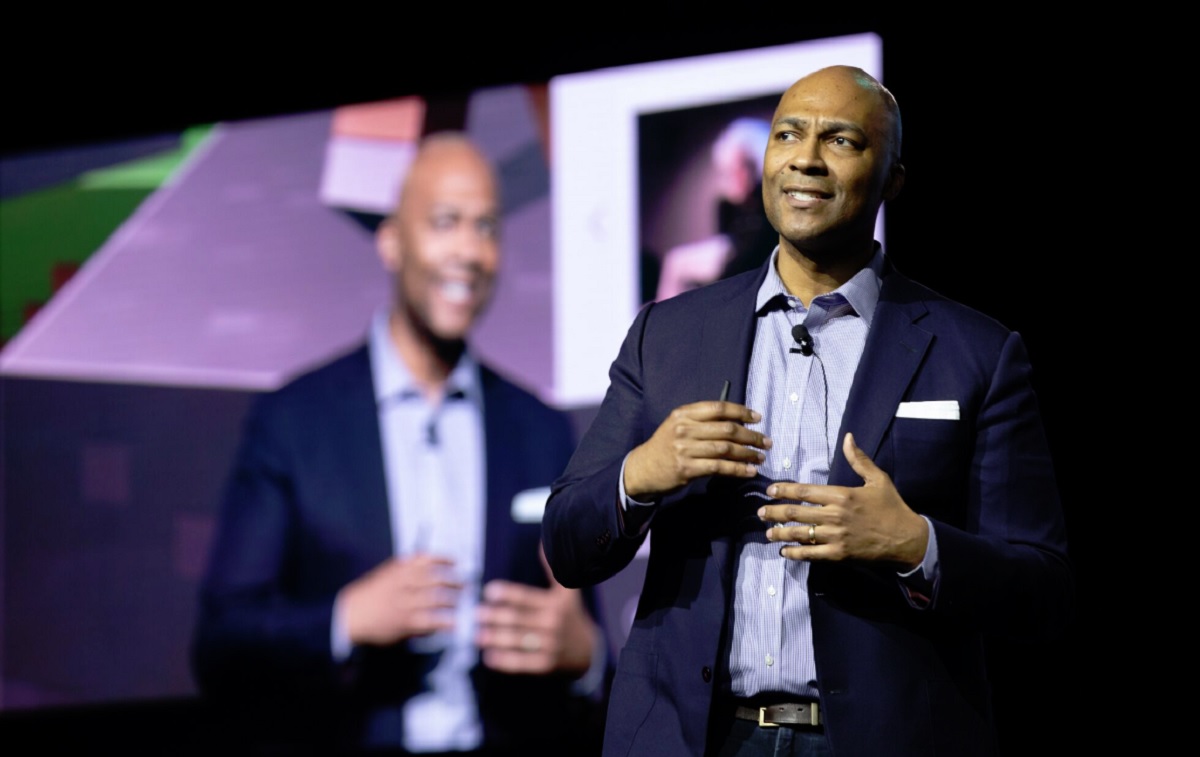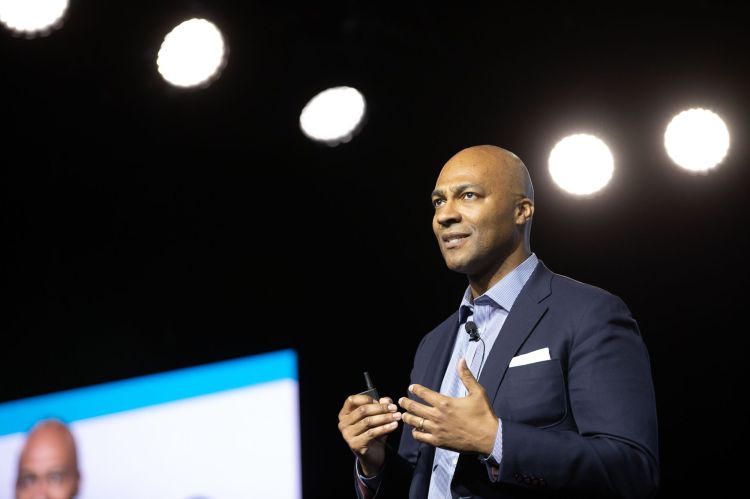As general counsel of the Entertainment Software Association, Stanley Pierre-Louis was the top lawyer in the country for the trade group that protects the interests of the video game industry. He stayed out of the spotlight, but he had to stay sharp on a lot of legal issues affecting the largest and smallest video game publishers.
But after Mike Gallagher left the CEO job last October, Pierre-Louis was named acting CEO of the ESA. And now he is stepping into the spotlight. At the recent DICE Summit, the elite game event in Las Vegas last week, he gave a talk about the sensitive topic of video game addiction. Last June, the World Health Organization rained on the post-E3 afterglow by proposing to treat compulsive video game playing as an addiction, subject to treatment as a medical disorder.
Pierre-Louis thinks that’s a bad idea because it isn’t supported by a preponderance of medical evidence. I talked with him about this after his talk, and probed into why it’s appropriate for parents to have conversations with their kids about too much screen time and why it isn’t OK for the WHO to treat the condition as a medical problem. When the WHO gets it wrong, it can have dire consequences that lead to risks of regulation, misdiagnosis, stigmatization of game playing, and even sending kids away to harsh treatment camps in some countries, he said.
We also talked about a variety of other subjects, including the federal government’s interest in gaming, the competition with other countries for video game jobs, possible trade conflict with China, the classification of loot boxes as gambling in some territories, unionization, and how the U.S. games industry will stay competitive.
Prior to joining the ESA, Pierre-Louis was associate general counsel at Viacom. Earlier in his career, he was the legal boss at the Recording Industry Association of America. There, he led several strategic copyright litigations, including the entertainment industry’s litigations against MP3.com, Napster and Aimster as well as the landmark U.S. Supreme Court case MGM Studios v. Grokster, which resulted in a unanimous decision in favor of the film and music industries.
Here’s an edited transcript of our interview.

Above: ESA acting CEO Stanley Pierre-Louis.
GamesBeat: Are we going to end up with a Department of Games in the federal government?
Stanley Pierre-Louis: [laughs] I don’t know that there will be a department. But I will say, at the federal level there is a lot of interest in the power of games. You have, for example, the Department of Education that funds game research and how to use games in educational ways. Past administrations have actually had a video game guild, where they talk about games. Obviously there was Constance Steinkuehler, who’s a professor at UC-Irvine now. She spent time at the White House promoting the value of games in learning. There is a lot of interest in the power of games.
GamesBeat: But there isn’t really a games-related position anymore, [like Mark DeLoura held] right?
Pierre-Louis: Each administration takes its own tack on how they prioritize tech. What we’re seeing a lot of now — there was an announcement yesterday or today from the White House about their focus on AI. Obviously privacy is a big topic in Washington. What we’ve been trying to do is share the power of games for entertainment, for our economy, for education, for health care. Just talking about the full bouquet of issues where games help. It’s been a message that resonates.
GamesBeat: Are you interested in a permanent version of this job?
Pierre-Louis: I’m excited to serve in whatever capacity I can do for this organization. It’s been a thrill and it’s going to continue to be a thrill, primarily because we have amazing members who are making exciting games and care about our issues. We have an amazing board that wants us, even in this interim period, to press forward with the important mission of the organization. We have amazing colleagues who are super smart — lawyers and analysts and lobbyists and PR folks — and they all love games. We have people on staff who compete in game tournaments. It’s an exciting time to be at ESA and in this industry at our level.
GamesBeat: I thought your topic was interesting, about the WHO controversy there. You’re a parent, right?
Pierre-Louis: Yes, I am.
GamesBeat: I’m a father of three girls. Parent to parent conversations, I think, don’t get so much into the legalistic side of things, but generally speaking, I think parents will be very concerned and talk a lot about addiction. With my kids, I talk to other parents about how much screen time you want them to have, what kind of games are appropriate for them at certain ages. We talk about that using the word “addiction.” I can see the reason to stand up and say that there is no addiction to people who want to regulate a business. But I do wish we could have more of this parent to parent kind of conversation, where people acknowledge that there are some things you want to control and not have getting out of hand. I can understand why the ESA wants to take a legal stance toward the WHO, but I think it would also be helpful to have the ESA help with that parent conversation.

Above: The ESA says parents are aware of video game ratings.
Pierre-Louis: That’s a great setup for the question, because we have this conversation on all levels. One is that we’re careful with our terms because it’s a medical term. It has a very specific meaning. We’re careful not to conflate medical issues with other parts of the conversation.
In terms of screen time generally, that conversation is interesting because it’s not just about video games. It’s about screens in general. It’s important to distinguish healthy screen time and whatever else you want to use to describe the other. More and more, you’re seeing in schools that kids are using Chromebooks and other devices for all their courses. It’s become a mainstay in how kids interact with education today. It’s important to think about, for example, what the UNICEF report talks about. It’s about the quality of the screen time, not the time.
As a parent, you’re empowered by being a parent to manage that. From our perspective, we also provide the tools that we’ve talked about in the speech, about parental controls on the consoles. There are tools in place, as well as just the role you have as a parent in managing your kids’ time.
GamesBeat: It’s still important to oppose the WHO if there’s some faulty science there, if they don’t really have video game experts helping them. What I would prefer not to happen is to have the conversation shut down because everyone is digging in and saying either there is addiction or there’s no addiction. Because we deny that there’s any addiction, we can’t have this conversation that parents have.
Pierre-Louis: Our argument with the WHO has been over the impact of a conclusion based on a lack of medical consensus, which is different from the conversation you’re talking about. But that’s critically important because it impacts the discussion. Is it a symptom? Is it the cause? That gets into a lot of medical issues. As a parent, it’s all about having the tools in place to impose the rules you want to impose on your household.
GamesBeat: What do you see across different governments around the world and how they’re approaching games now? Does anything seem like a better approach to you, or do you worry about the approaches governments are taking? I think in particular about China, which seems sometimes to have their act together, but other times they seem like they don’t know what they’re talking about.
Pierre-Louis: I think different countries just approach regulation differently. The U.S. has a market-based approach. It relies a lot on self-regulation, as well as rules in place where the government — whether it’s state or federal — feels like it needs to step in. Other countries are more regulatory states and they take a different approach to lots of topics, including ratings. What you’re seeing in various states in this discussion are really the governmental approach they have and how that interacts with this discussion.

Above: Stanley Pierre-Louis says medical studies do not support a case classifying video game addiction as a health risk.
GamesBeat: Even then, the term “addiction” comes back and gains importance. People who trying to regulate loot boxes are saying that it’s like gambling, and gambling can cause addiction, therefore you have to control loot boxes. And yet if you don’t think there’s an addiction problem there’s no need to do that kind of regulation. It’s interesting how it will come up in different ways.
Pierre-Louis: It comes up in lots of ways. What we try to stress, again, is parental controls. That provides an opportunity to not only limit the time you spend in games, but the amount of money you spend. As a parent you’re able to use those tools to manage what content is being accessed by age, what’s being accessed in terms of time, as well as spending.

Above: The ESA’s report on game jobs and companies in the U.S.
GamesBeat: On loot boxes, do you think regulation is coming? Do you have any particular position on what you’d like to see happening?
Pierre-Louis: We’ve described loot boxes as — let me put it another way. The way you approach the question brings a lot to mind. Video game companies try to bring value to games in lots of different ways. Sometimes it’s through earned items, various digital items. Sometimes it’s through monetization, through different mechanisms. Loot boxes are just one of those ways that allows engagement by a consumer in an optional way. It allows for more ways to get a return on value in various games.
The thing that’s interesting about it is it’s really a sandbox, which makes it different from some of the regulatory discussions that are happening. You pay into a game and you can’t cash out. That makes it distinctly different from a lot of the other discussions that are happening.
GamesBeat: It looks like it may center on whether or not you can have random stuff in loot boxes, or if you should know what’s going to be in them before you buy them.
Pierre-Louis: Yes. Different regulatory bodies have taken different views on that.
GamesBeat: It seems like such a small difference, but it can, again, be magnified in importance depending on where you go with it. If you’re going to start a gambling business, you can’t have people knowing what’s in the box.
Pierre-Louis: Just for clarity, loot boxes clearly aren’t gambling from a legal standpoint.
GamesBeat: Because you can’t take money out.
Pierre-Louis: Exactly. That means you’re not putting something at risk. If you look at the standard for gambling, it just doesn’t meet that definition. That’s not just true in the U.S. It’s true in France and the U.K. and lots of other countries. They’ve determined affirmatively that it’s not gambling. Even in the states, even in the countries where the issue’s been raised, it’s been raised as the specter of the possibility of regulation, but nothing’s been approved yet.
GamesBeat: What else is on your agenda? What else do you want to talk about?
Pierre-Louis: The number one thing for us is getting a positive message out about video games. It tells such a great story. We’re dual DNA, tech and IP. That means we enter a conversation where we can talk about various components — the innovation economy, the creative economy. If you look at policy issues like digital trade, again, we tell a great story, because we’re a trade surplus industry for the United States. Regulators and policy makers like hearing about positive impact industries, which we are.
We’re also seeking incentives in various states so we can build out additional facilities, creating great games and keeping them here in the United States. That tells a very positive story of growth and development for the industry in the states.

Above: China’s game revenues will pass $42 billion by 2022.
GamesBeat: Do you have any approach so far that might be similar to or different from the way Mike was doing things?
Pierre-Louis: Well, I’m the acting CEO. I’m just trying to work with an amazing team to ensure that we’re completing our mission, which is to amplify the great things our members are doing and that this industry is all about.
GamesBeat: With this year’s E3, do you expect it to be different from past years? Any ideas on how E3 is taking shape so far?
Pierre-Louis: E3 has evolved over the years. We added consumers in recent years. E3 Coliseum, esports competitions. What you’ll see each year at E3, including this year, is the evolution of E3 to match the evolution and trends of our industry. That’s important, because we need to amplify the products being announced, the announcements being made generally by the exhibitors and our members, and really shine a light on the industry in a positive way. It’s such an important moment for the industry every year. People pay attention what’s announced at E3. We want to make sure that gets the widest audience possible. So stay tuned.
GamesBeat: Do you still think that some of the biggest moments of the year are going to come at E3?
Pierre-Louis: We hope so. It’s shaping up to be an exciting year.

Above: Sony has dropped out of E3.
GamesBeat: On the technology side, Microsoft’s talk was interesting just now. They talked about how there could be a lot of implications for gaming from 5G. Maybe you get into totally different world where almost any game could be played in a mobile way. Right now we’re fairly restricted in what kind of mobile games we can make, technologically. Do you think the industry needs to push forward to do anything in particular on new technologies?
Pierre-Louis: Within the past month there were at least four announcements from companies saying they were going to be the Netflix of games. The conversation on 5G is really relevant to that discussion. You need stronger broadband. You need deeper broadband penetration, which includes not just urban but rural broadband. You need a consumer model of broadband that makes accessibility easy for the streaming game market to really flourish. It can’t just be in five really wired cities to be a success.
That’s how I read the Microsoft talk. I think it’s very true. You need that capability if you’re really going to expand, particularly with some of the games that are being developed and the richness of it and the amazing quality of the graphics. You’re going to need a strong pipe.
GamesBeat: We mentioned that there’s a market basis to how the government looks at games right now. I still worry about the games business in the U.S. — the number of jobs that get created here and whether those jobs can be siphoned off or exported to other countries like Canada, because they have so many incentives. Should the government do anything proactive about that? Do you think certain regions might be weakening? Are too many foreign companies starting to buy up American companies? I’m not sure market forces are always going to turn out the right way for the country when it comes to some of these things.
Pierre-Louis: Our members are looking to create more and more games here in the United States. Part of that is creating the right pipeline for game development. That starts with the educational system, encouraging more STEM-related courses and degrees, exciting students about STEM careers. We’re also proponents of expanding the H1B program to bring talented foreign nationals to the United States to create games, including students who come to study here and then have to leave if they can’t secure the visa necessary.
We’re a good story on H1B. We’re hiring for highly technical, high-paying jobs doing work on products made in the United States. We like to tell that story. I think that’s going to have a big impact, being able to have talent acquisition include a modernized H1B program.

Above: The biggest investments in game companies in 2018.
GamesBeat: We have countries like Canada very aggressively going after jobs, but we don’t have that many efforts like, say, Louisiana’s, to create jobs in the United States. Does that worry you, or do you have a particular reaction to that?
Pierre-Louis: We certainly pursue incentives wherever possible. Last year we were able to secure a tax incentive in Tennessee for the production of video game music. Tennessee is such an important state in the music world. Being able to produce more game music there has been powerful for the industry. We look for those opportunities. States want to have video game employees. We’re a modern economy that modernizes a lot of the local community. It adds to the local discussion and flavor. We’re aggressively pursuing those kinds of incentives as well.
GamesBeat: I remember people talking about Telltale when they had their shutdown. That came as a surprise to everyone, and a lot of people started bringing up unionization as an answer, or something that could be done in response. I think the ESA doesn’t necessarily believe that’s the answer?
Pierre-Louis: What we know of our members is they try to create the best environment to create the best works on earth. Those kinds of decisions get made on a company by company basis. We leave it to our members to determine how best to address that issue.
GamesBeat: The Chinese government and Chinese companies are very powerful. They have a very powerful stock market that gives them lots of cash, and a home market that gives them a lot of firepower. They can go and acquire American companies, but American companies can’t go there and exploit that market so easily. They have to go in as a joint venture partner and share half the profits with a Chinese company. It’s why those Chinese companies have gotten so big. There’s an imbalance that can be exploited. I’m not sure what [you can do] about that. But of all the things that seem like they’re unfair in the world, that seems like one of the most important.
Pierre-Louis: It’s definitely a hot topic. Our industry looks for opportunities to reduce market barriers everywhere. One of our biggest topics is digital trade. A lot of the laws that require local servers, localized content — we want to ensure that there are opportunities for us to do business in the most efficient ways. We’re always looking to reduce market barriers. We see the administration trying really hard on that issue.

